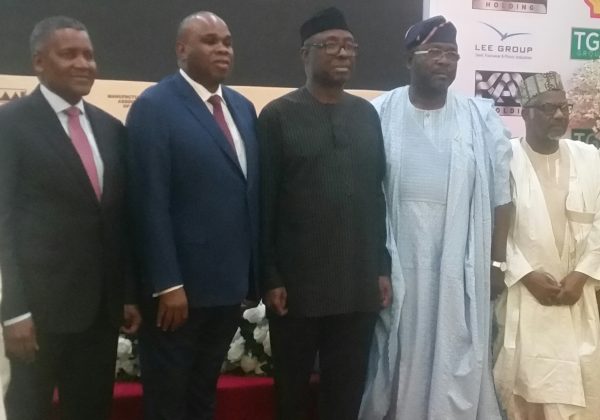
By Kenneth Jukpor
As part of efforts to curb the high rate of unemployment in Nigeria and boost the nation’s economy, African Export and Import Bank (Afreximbank) has admonished the government to prioritize labour intensive manufacturing.
The President of Afreximbank, Prof. Benedict Oramah made this call at the 47th Annual General Meeting (AGM) of Manufacturers Association of Nigeria (MAN) in Lagos, this week.

Prof. Oramah, while delivering a lead paper on the theme, “Improving the Value Chain in the Manufacturing Sector for Competitiveness and Job Creation, stated that Nigeria should adopt the transformational agenda used by China by maximizing the opportunity of a large youthful population as workforce for labour intensive manufacturing.
He also disclosed that the bank would allocate $500 million from its Nigeria-Africa Trade and Investment Promotion Programme to support Nigerian manufacturers to take advantage of the opportunities offered by the African Continental Free Trade Area (AFCFTA) agreement, Bank President Prof. Benedict Oramah, has announced in Lagos.

According to him, the facility would support Nigerian manufacturers to expand trading in their products and enable them source raw materials from other African countries.

Speaking on the fund, Oramah said, “It would also support them to adjust to any difficulties that might arise due to the implementation of the AfCFTA agreement, he continued, adding that Afreximbank officials would meet with representatives of MAN to work out the implementation modalities, terms and conditions for the facility”
President Oramah said that the opportunity for African manufacturers under the AfCFTA was phenomenal and that intra-regional trade in manufactures could rise to more than $150 billion by 2022 as a result of the entry into force of the agreement.
Meanwhile, President Mohammadu Buhari commended MAN for its representation on the Nigerian Industrial Policy and Competitiveness Advisory Council and other relevant committees on board of government institutions.
“Going forward, MAN will also be represented on the Action committee of AfCFTA that will soon be inaugurated. Over the years, MAN has been a valuable partner to government, especially this administration. You will all agree with me that last four years have been tough on many fronts. However, MAN has always been there as a partner to provide advice, guidance and support on how best to move this country forward” the President said.
Buhari who was represented by the Minister of Industry, Trade and Investment. Otunba Niyi Adebayo, assured that his administration’s priority is to develop and implement policies that would energize the rural economy.
“We started with agriculture and food security and the sector has the largest and quickest potentials to create jobs across the country both skilled and an unskilled. We started working with monetary authorities on policies that enabled urban based processing industries to patronize rural based protective sector. As a result we have seen increase linkages between millet and silo farmers with beverage producers, between maize farmers and poultry producers and of course, between paddy farmers and rice millers. These are just examples of the opportunities created when players in developed and urban economy support the development of its citizens on a self rural region” he added.
Earlier in the welcome address, the President of MAN, Mr. Mansur Ahmed noted that the public session was an good occasion to focus attention on the state of Nigeria’s economy with special emphasis on the manufacturing sector.
While he commended President Buhari’s administration for the emphasis on economic diversification and agricultural transformation, he lamented that manufacturing sector has been afflicted by the enormous appetite for oil price determined foreign currency flows, as well as the propensity to prioritize foreign goods over Nigerian-made goods.
Addressing President Buhari, Mansur said, “Your Excellency, your first term in office began with our economy in an undesirable recession brought about largely by our almost total dependence on a single commodity – oil; despite the abundance of resources with which our country is endowed. The result of this failure to diversify resulted in an economy that is both import dependent for its consumption and even more tragically dependent for its revenue on international oil prices over which we have no control”
While he commended several government initiatives, such as the Economic Recovery and Growth Plan (ERGP), Presidential Enabling Business Environment Council (PEBEC), and the many Executive Orders aimed at strengthening the productive sector to create jobs and lift Nigerians from poverty, he noted that the nation’s economy is still fragile.
Highlighting some of the daunting challenges facing Nigerian manufacturers, he itemized the state of infrastructure, poor supply of electricity, access to ports and their low operating efficiencies, poor condition of highways and waterways, and the absence of a credible rail network.
He urged President Buhari to address these issues in his second term, noting that the signing of the AfCFTA agreement as well as other economic factors will expose the nation’s economy to more risks and challenges.
“For AfCFTA to succeed, we must develop policies that promote African production among other benefits. Africa, therefore, needs not only a trade policy but also a continental manufacturing agenda. The theme of the 47th AGM, “Improving the Value-Chain in the Manufacturing Sector for Competitivness and Job Creation,” is therefore intended to direct our attention to the need for a robust – manufacturing production agenda. An agenda that supports the vision of intra-African trade for the free movement of goods and services made in Africa” he said.
 MMS PLUS NG – Maritime, Aviation, Business, Oil and Gas News Online Newspaper with coverage in Maritime, Oil and Gas, Aviation, Power and Energy as well as Financial News
MMS PLUS NG – Maritime, Aviation, Business, Oil and Gas News Online Newspaper with coverage in Maritime, Oil and Gas, Aviation, Power and Energy as well as Financial News









